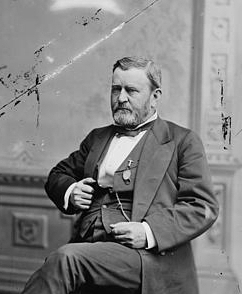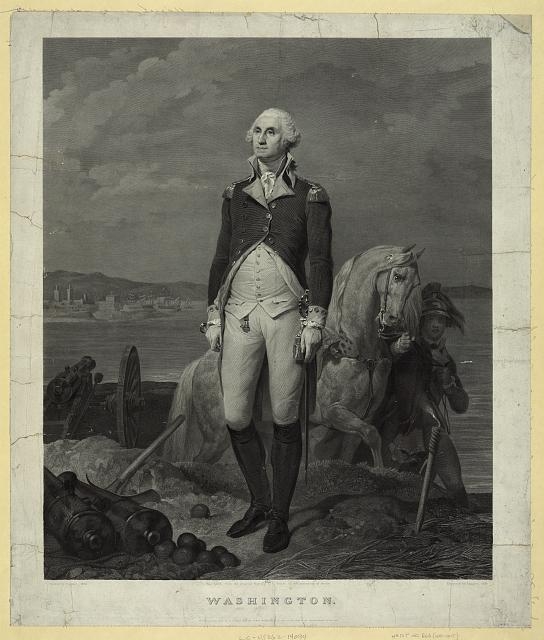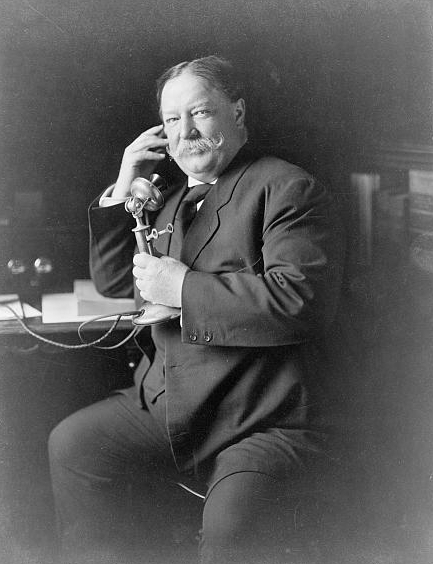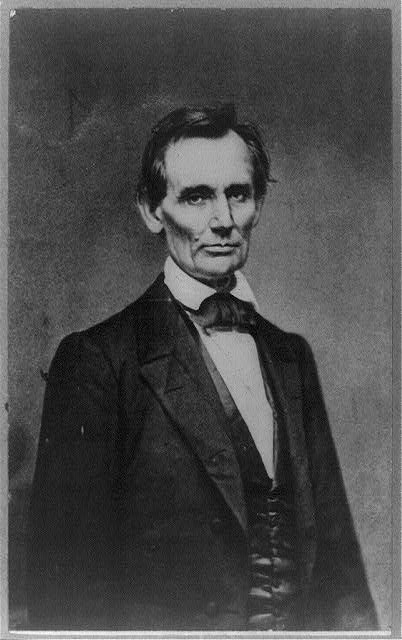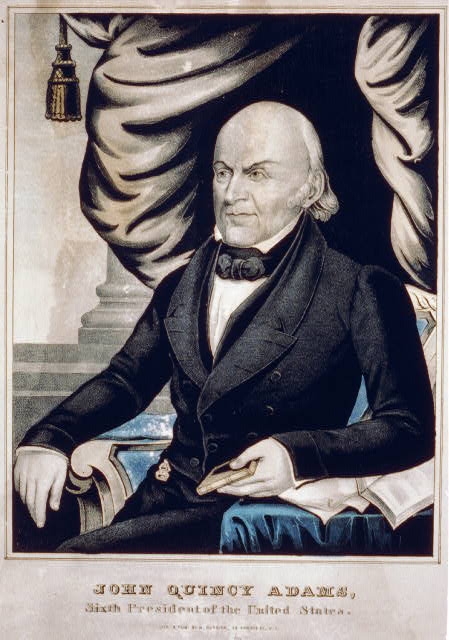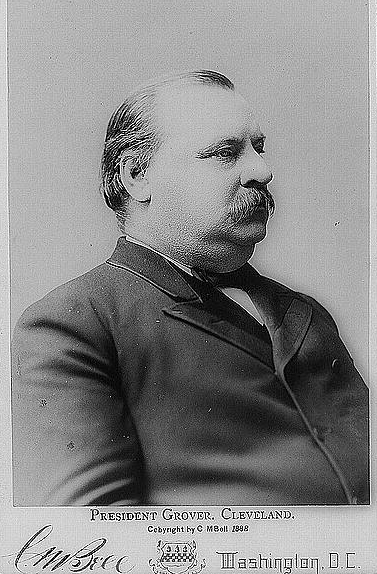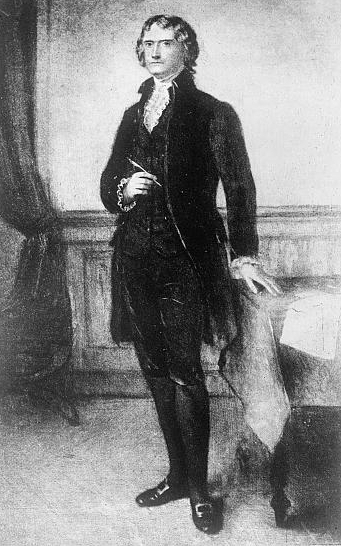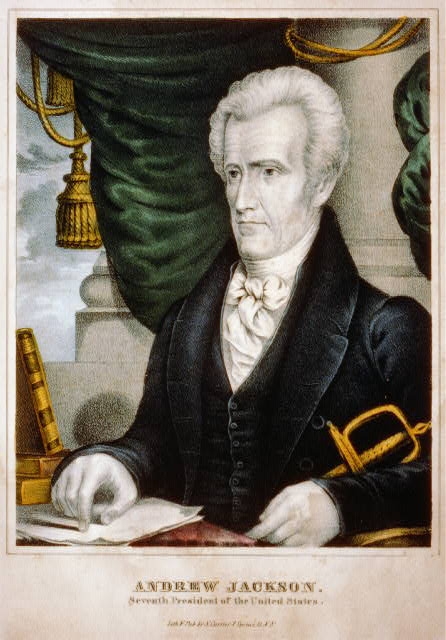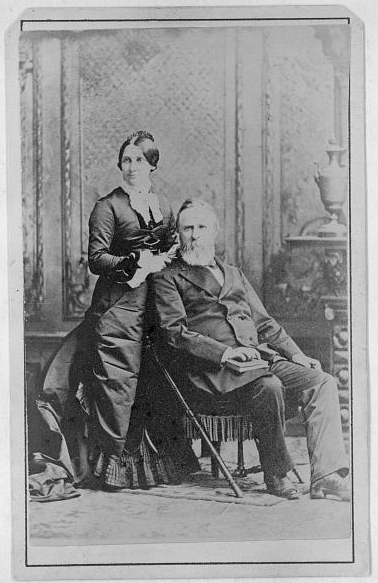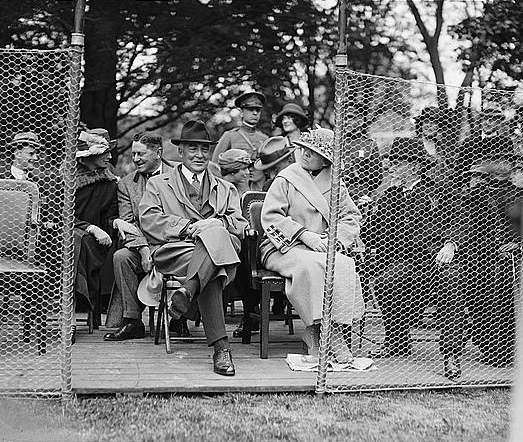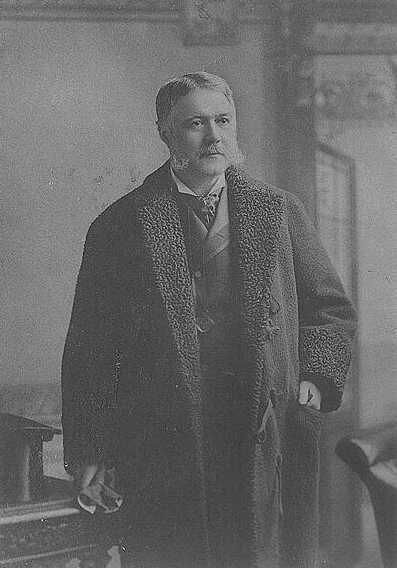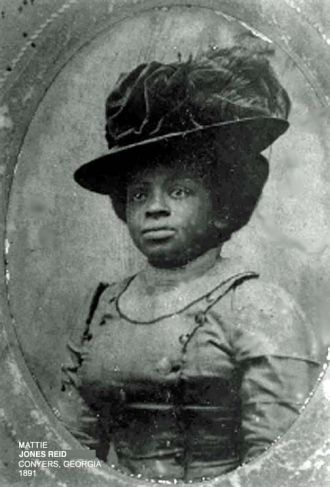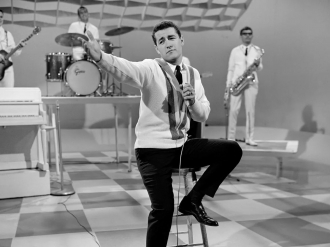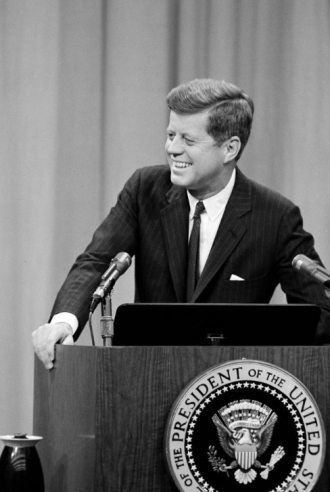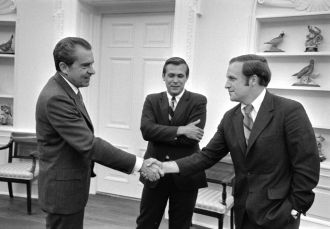
President Grant (18th)
 AncientFaces
AncientFaces Major scandals made President Grant's one of the most corrupt administrations. First, his sister's husband tried to aid Jay Gould and James Fisk in a scheme to corner the gold market by manipulating Presidential policies. They failed, but they did get far enough along that the gold market collapsed, causing "Black Friday" in 1869.
The Whiskey Ring Scandal involved much of his Cabinet, including his personal secretary (who he protected). It was discovered that government officials and employees were pocketing the taxes collected on the sale of whisky. Grant stopped this but protected those close to him.
The Credit Mobilier Scandal involved the VP, Congress, and many other members of government. The Credit Mobilier Company was stealing from the Union Pacific Railroad. When they were about to be exposed, they tried to cover up the scandal by offering stock to government officials and employees at huge discounts.
George Washington (1st)
 AncientFaces
AncientFaces Through the Jay Treaty, President Washington granted Great Britain favored-nation status, a move that stirred controversy and heated debates among his contemporaries. Thomas Jefferson was one of Washington's most vocal critics, repeatedly accusing him of treason because of the Treaty. Jefferson's accusations were rooted in his belief that the Treaty was a betrayal of America's revolutionary principles and an affront to its sovereignty.
Washington intended to address Jefferson's accusations in his farewell address, which he had been working on for months. However, he ultimately chose not to engage in a public rebuttal, recognizing the potentially destructive impact that a bitter political fight could have on the young nation. Instead, he used his farewell address to caution against the dangers of political parties and to promote national unity, a message that remains a powerful reminder of the need for bipartisanship in American politics.
William Taft (27th)
 AncientFaces
AncientFaces During President Taft's presidency, the head of the Department of the Interior was accused of interfering with a coal mining investigation in Idaho. When the accuser spoke out about the alleged misconduct, Taft fired the accuser and exonerated the accused. The incident caused a significant uproar in the press and fueled criticism of Taft's administration. In the 1912 presidential election, the progressive wing of the Republican party defected to the Democrats, intensifying the already contentious race.
Ultimately, Woodrow Wilson, not Taft, emerged victorious in the election, but the period leading up to it was marked by intense political division and bitter infighting. The scandal involving the Department of the Interior served as a rallying cry for Taft's opponents, who saw it as evidence of corruption and cronyism in the government. The controversy ultimately contributed to a significant realignment of the political landscape and set the stage for the progressive reforms of the following decades.
Abraham Lincoln (16th)
 AncientFaces
AncientFaces When President Lincoln took office, his Secretary of War was Simon Cameron, who had a reputation for being highly corrupt. He was famously accused of being willing to steal anything except a red-hot stove. In 1862, Lincoln requested that Cameron resign from his position as Secretary of War and instead appointed him as Minister to Russia. This move effectively removed Cameron from the sphere of influence where he could do further harm to the war effort.
Lincoln's decision to reassign Cameron to Russia was likely motivated by a desire to distance himself from the scandal surrounding the Secretary of War. By sending him overseas, Lincoln could remove Cameron from the public eye and minimize his impact on the administration's reputation. The move also allowed Lincoln to install a new Secretary of War, Edwin Stanton, who would prove to be a key figure in the Union's victory in the Civil War.
John Quincy Adams (6th)
 AncientFaces
AncientFaces In the 1824 presidential election, Andrew Jackson won the popular vote but failed to secure a majority of electoral votes. As a result, the election was decided by the House of Representatives, where a series of backroom deals resulted in John Quincy Adams being declared the winner. Jackson and his supporters were outraged by the decision, which they saw as a violation of the will of the people. They claimed that the presidency was "illegitimate" and refused to recognize Adams as a legitimate president throughout his term.
Despite his defeat in the 1824 election, Jackson remained a popular and influential figure in American politics. He continued to campaign for the presidency and was ultimately elected in 1828, defeating Adams in a landslide victory. Jackson's victory was seen as a rebuke of the political establishment and a validation of the popular will. The controversy surrounding the 1824 election helped to solidify Jackson's status as a populist champion, and his presidency would be marked by a series of reforms aimed at empowering the common people and limiting the power of the elite.
Grover Cleveland (24th)
 AncientFaces
AncientFaces During the presidential campaign of 1884, a derogatory slogan was frequently chanted by supporters of the opposing candidate aimed at Grover Cleveland, who was the Democratic nominee. The slogan was "Ma, ma, where's my pa? Off to the White House, ha ha ha!" The taunt referred to an affair Stephen Grover Cleveland had with a woman named Maria Halpin, which resulted in the birth of a son. Cleveland, however, did not attempt to conceal the affair and even took responsibility for the child, paying for his upbringing and education.
Despite the scandal, Cleveland was elected as the 22nd President of the United States in 1884, defeating Republican candidate James G. Blaine. In fact, Cleveland was elected for a second term in 1892, becoming the only U.S. president to serve two non-consecutive terms. While his affair with Halpin was certainly controversial, Cleveland's honesty and willingness to take responsibility for his actions ultimately won the respect of many voters.
Thomas Jefferson (3rd)
 AncientFaces
AncientFaces In 1802, Thomas Jefferson faced accusations of having a relationship with his slave, Sally Hemings, and fathering one of her children. Despite his denials, he remained as President for another seven years until the end of his second term. The allegations remained a topic of controversy for many years, with some questioning their veracity.
Recently, DNA tests have been conducted that provide evidence that Jefferson fathered at least one of Hemings' children, and possibly as many as six. While some historians still dispute the results of the DNA testing, most now accept the evidence as accurate. The controversy surrounding Jefferson's relationship with Hemings and the implications of this on his legacy continue to be debated by both scholars and the public.
President Andrew Jackson (7th)
 AncientFaces
AncientFaces During Andrew Jackson's campaign for the presidency, it was discovered that he had unknowingly married his wife, Rachel, before her divorce was finalized, which technically made her a bigamist. They legally remarried in 1794 after her divorce was finalized. However, during Jackson's 1828 presidential campaign, this issue resurfaced, and it became a major campaign issue. Rachel died before he took office, and Jackson blamed her death on the scandal.
After Jackson became president, his Secretary of War, Eaton, faced accusations of marrying a "tavern maid" whose husband had committed suicide. High society gossiped that Eaton's affair with her had caused the suicide. As a result, all but one of the Cabinet members resigned in protest, with their wives leading the campaign against Eaton and his wife.
President Hayes (19th) and Mrs Hayes
 AncientFaces
AncientFaces In the final days of his presidency, Rutherford B. Hayes nominated Stanley Matthew for a position on the Supreme Court. However, Matthew's close ties to several corporations, particularly railroads, raised concerns among senators. As a result, the Senate refused to consider his nomination.
When James A. Garfield became president, he made another push to get Matthew appointed to the Supreme Court. This time, the Senate narrowly approved the nomination, with a vote of 24-23. As of 2023, this remains the closest vote for a Supreme Court justice's nomination in history. Despite the contentious confirmation process, Matthew went on to serve on the Supreme Court for over eight years and was widely respected for his legal acumen and impartiality.
President Warren G. Harding (29th) with wife Florence
 AncientFaces
AncientFaces During his presidency, Warren G. Harding became embroiled in several scandals that tarnished his legacy. The most notable of these was the Teapot Dome scandal, which involved the transfer of control of naval oil reserves to the Interior Department. The Secretary of the Interior, Albert Fall, accepted bribes from oil companies in exchange for dispersing the oil. This scandal is considered to be one of the biggest in U.S. history - that is, until prior to the Watergate scandal.
In addition to the Teapot Dome scandal, Harding was also implicated in the Veterans Bureau scandal, which involved giving jobs to political cronies. These scandals and others came to light before Harding's death in 1923, just two years into his presidency. Despite his earlier popularity, Harding's legacy was forever tarnished by these scandals, which called into question his administration's integrity and ability to govern.
Chester Arthur (21st)
 AncientFaces
AncientFaces Chester Arthur had been fired from his position as Collector of the Port of New York by President Hayes as part of the Hayes' efforts to reform the patronage system. However, when he became President after the assassination of James Garfield, he went on to lead an honest and responsible administration, much to the surprise of his contemporaries. He was widely lauded for his attention to duty and for avoiding any potentially risky undertakings during his time in office.
Arthur was known for his steadfast commitment to civil service reform and for upholding the rule of law. He made sure to fill federal positions based on merit rather than political connections, and he also signed into law the Pendleton Civil Service Reform Act which provided for a nonpartisan civil service system. His administration was marked by a series of important infrastructure projects, including the expansion of the US Navy, the construction of new harbors, and the development of a modernized merchant marine.
The best: Abraham Lincoln, George Washington, and Franklin D. Roosevelt, are often in the top three. Then come Harry S. Truman, Woodrow Wilson, Dwight D. Eisenhower, James K. Polk, Theodore Roosevelt, Andrew Jackson, James Madison, and Thomas Jefferson.
The worst: Andrew Johnson, Franklin Pierce, Warren G. Harding, Millard Fillmore, James Buchanan, Herbert Hoover, William Henry Harrison, George W. Bush, Zachary Taylor, and John Tyler.
Interesting Presidential Facts: Jimmy Carter was the first President born in a hospital; John Quincy Adams enjoyed skinny-dipping in the Potomac River when he was President; John Adams and Thomas Jefferson were both friends and rivals - and they died on the same day, July 4, 1826; Andrew Jackson had 100 duels and was in a bar fight with a Senator; Millard Fillmore's first wife was his teacher (when he was 19); when President, Franklin Pierce was arrested for running over a woman with his horse - the charges were dropped "for lack of evidence"; William Taft (who was obese) was once stuck in his White House bathtub and had to be helped by his staff; Herbert Hoover's son kept pet alligators in the White House and they were occasionally allowed to run loose!
Have photos that you'd like to see included? Share your photos, or click "next page" to see the top 10 wealthiest Presidents (in today's dollars)

